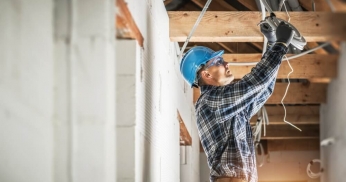 Home Insurance
Home InsuranceHow does cottage insurance work in Canada?
This article has been updated from a previous version. Cottage insurance, or recreational property insuran...
 Menu
Menu Save more than 30% on home insurance with LowestRates.ca.
Get 50+ quotes in 3 minutes.
Compare home insurance rates from Canada's leading home insurance providers

have compared rates and saved money over the last 24 hours
Most of the time, when you buy a home, you plan to live in it. However, there are certain situations where a property may remain unoccupied. Leaving a house vacant comes with certain risks. Insurance for a vacant home can help you reduce those risks and deliver peace of mind.
Whether it's an investment property or your personal dwelling, a vacant home is one that is unoccupied for 30 or more days. It may be that you or a tenant intend to return to the property but aren't there for the time being, or you take an extended vacation, or need to leave your home for a few months.
Regardless, home insurance companies may cancel your policy if they discover it's been left vacant without the proper insurance. The property does not need to be empty to be considered vacant, either, meaning your insurance company could cancel your coverage even if there are personal items, furniture, appliances, or belongings inside.
If you're away from your home for 30 days or less, your home insurance coverage likely won't be interrupted. If you're gone for longer, and your home sustains damage on the 35th day of your abscence, for example, your coverage may no longer apply. This is sometimes referred to as the 30-day occupancy rule.
Because vacant homes are exposed to more risk than occupied ones, many insurers require homeowners to purchase a permit if you intend to leave it beyond 30 days. Typically, permits will cover your home for up to 120 days.
Vacancy permits will ensure that your home insurance policy coverage remains intact — it doesn't provide extra coverage. However, even with a permit, an insurance provider may not cover perils like flood damage, window damage, and vandalism. Your insurance company will also likely require you to make arrangements to maintain your property in your absence, for example, designating someone to check in on your home a few times a week. Each provider is different, so it's best to talk to yours about requirements and coverage exclusions.
A vacancy permit can increase your premium by $30 to $150 a month.
It’s important to keep your house in as good a shape as possible, especially when you are not there to help protect it. In order to reduce risks and costly damage you can do the following:
First, we need to know about you and your home. It only takes 3 minutes, and it’s 100% confidential.
Next, we’ll show you quotes from 50+ Canadian providers. It’s free, with no commitment.
When you find the best quote, secure your rate by talking to a licensed broker or agent.
Not all insurance companies offer vacant home insurance, since it's a high-risk proposition. Talk to your insurance provider or broker to see what coverage is available to you.
It’s best to tell your insurance provider if you're doing extensive renovations and plan to be away during that time. Being away more than 30 days could violate your policy and you might lose your coverage. A vacancy permit that provides extra protection might be a good solution, but you’ll need to discuss this with your provider to see if they offer it.
Cottages or vacation homes generally do not require special vacant home insurance. There is, however, vacation property insurance which will meet the insurance needs for that dwelling. In many cases you might have the option to incorporate your vacation property with your primary home insurance policy. Alternatively, you can decide to purchase a distinct policy specifically for your vacation property. Talk to your provider about protections, options and cost.

 Home Insurance
Home InsuranceThis article has been updated from a previous version. Cottage insurance, or recreational property insuran...
 Home Insurance
Home InsuranceDespite a decrease in interest rates over the last couple of years, Canada still has one of the most expensive real esta...
*Shoppers in Ontario who obtained a home insurance quote on LowestRates.ca from January to December 2023 saved an average of 30% The average savings percentage represents the difference between the shoppers’ average lowest quoted premium and the average of the second and third lowest quoted premiums generated by LowestRates.ca. Excludes condo and tenant insurance.